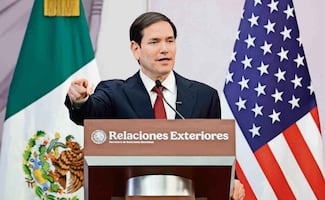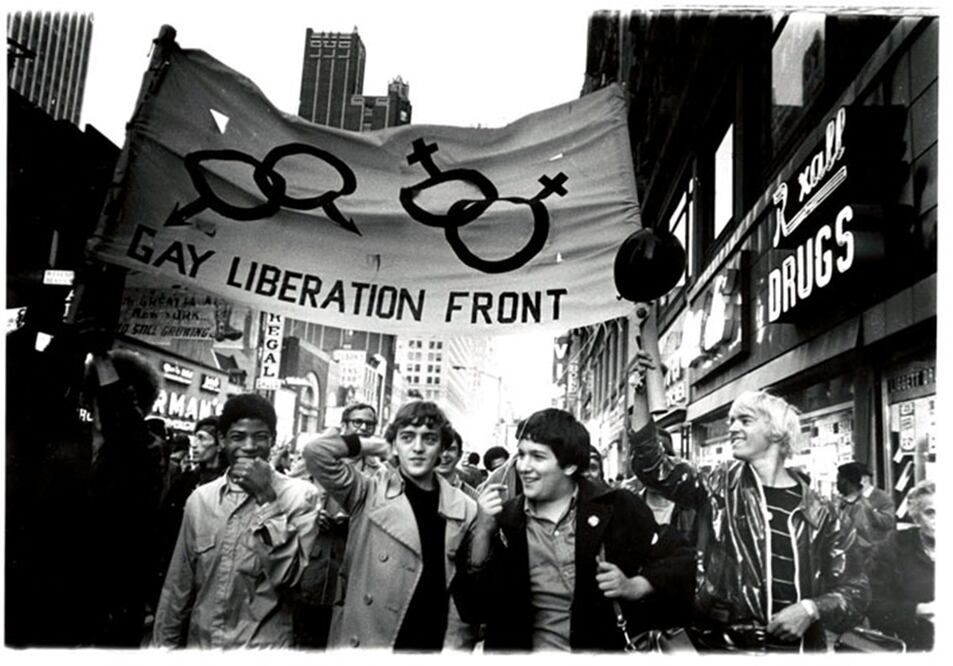Más Información

EU lanza ataque contra objetivos del Estado Islámico en Siria; Trump dice que es "represalia muy seria"

Clinton, Jagger y Michael Jackson aparecen en archivos de Epstein; pesquisa no es sobre el exmandatario, dice vocero

Corte Interamericana responsabiliza a México por feminicidio de Lilia Alejandra García Andrade; su madre ha luchado desde 2001

"Queremos cerrar este capítulo", dice Salinas Pliego al SAT; esperarán a enero a conocer fundamentos legales de adeudo fiscal

Marco Rubio destaca labor de seguridad de México; "están haciendo más que nunca en su historia", afirma

Hallan cuerpos en finca que ya había sido cateada en Silao, Guanajuato; suman 7 personas encontradas en menos de tres semanas
50 years ago, members of the gay (LGBT+) community in New York started a series of spontaneous and violent demonstrations against a police raid that began in the early morning hours of June 28, 1969 , at the Stonewall Inn in the Greenwich Village neighborhood of Manhattan .
The official version tells that a group of corrupt policemen, led by detective Charles Smythe and inspector Seymour Pine , from the New York Police Department , raided the Stonewall Inn to collect a weekly fee by which they allowed the establishment to continue operating without a license. The policemen threatened the establishment owners with arrests and sanctions.
The bar was owned by a local mafia group called the Genovese family . It was also a meeting place for foreigners, poor people, lonely teenagers, homosexuals, and lesbians who found shelter in the famous establishment.
However, the Genovese family soon realized that they could make more money by extorting their wealthy customers than selling alcoholic beverages illegally.
New York authorities stopped receiving their weekly fee and, as vengeance, shut the bar down permanently.
That morning, four plainclothes policemen in dark suits, two patrol officers in uniform, Detective Charles Smythe and Deputy Inspector Seymour Pine arrived at the Stonewall Inn's double doors and announced "Police! We're taking the place!." Stonewall employees do not recall being tipped off that a raid was to occur that night, as was the custom.
Drag queens, street youth, and even bystanders fought back. The altercation spread into the streets and more queer youth joined the uprising.
The stonewall riots lasted six days and marked the beginning of the LGBT rights movement.

A work in progress
Internationally, the struggle for LGBT rights remains daunting in much of the world. Stonewall helped inspire successful activist movements in Western Europe (a major British LGBT-rights group is called Stonewall) and elsewhere.
Earlier this year, the southern African nation of Angola decriminalized same-sex activity and banned discrimination based on sexual orientation. And just last week, the High Court of Botswana rejected laws that meant up to seven years in prison for those convicted of having gay sex, a landmark case for Africa.
But gay sex is outlawed in dozens of countries, while Asia and Africa each have only one nation that has legalized same-sex marriage.
Gay rights in Mexico
The first demonstration in favor of gay rights in Mexico City was in June 1079 , coinciding with the date of the violent Stonewall disturbances in June 1969 that lit the wick of the community's struggle for its rights.
Ever since, several states in the country have legalized same-sex marriage and homosexual relationships have been decriminalized throughout the country.
However, Mexico remains a deeply sexist and homophobic country, often normalizing violence against homosexuals and members of the transgender community.
Though the country has been praised for taking huge steps towards LGBT+ inclusion, there is still a lot to be done.
dm
Noticias según tus intereses
[Publicidad]
[Publicidad]









